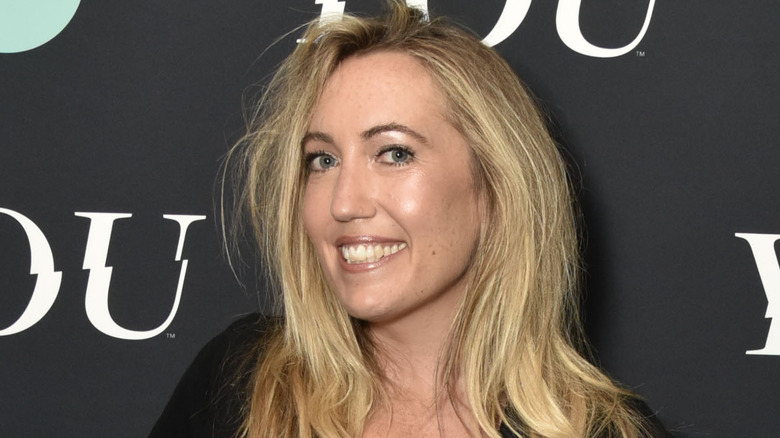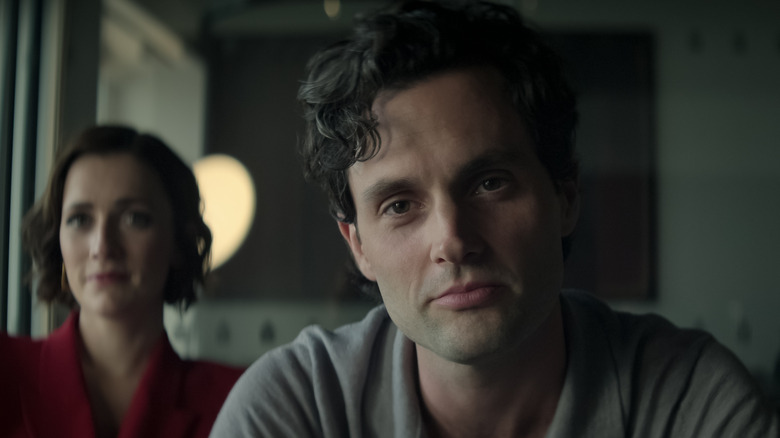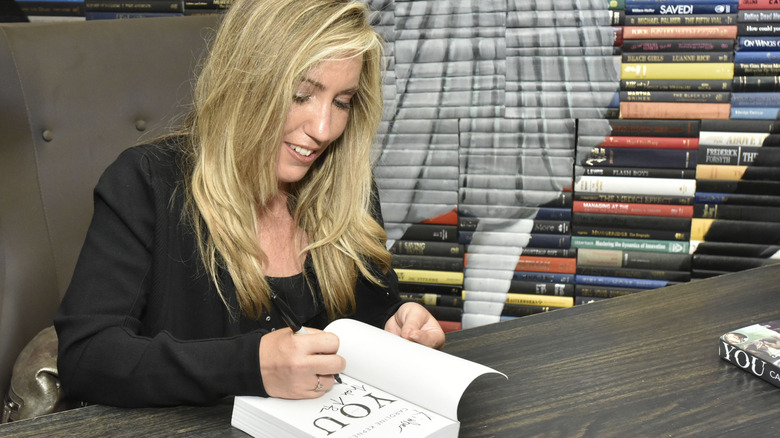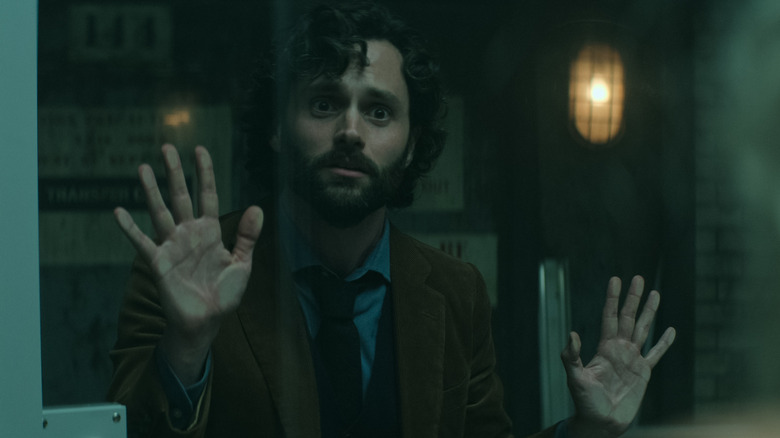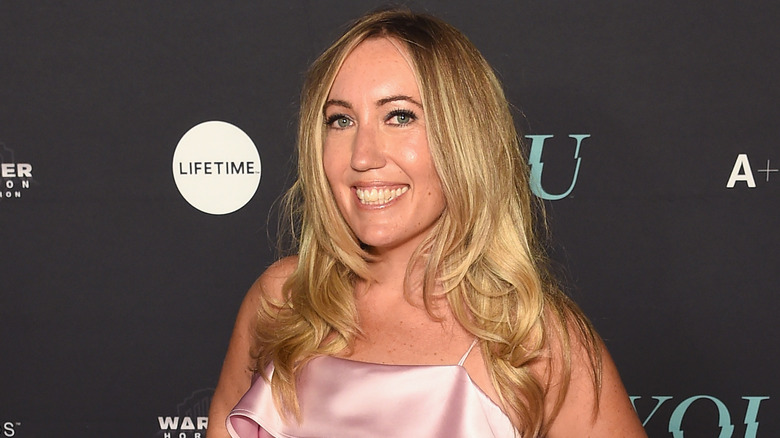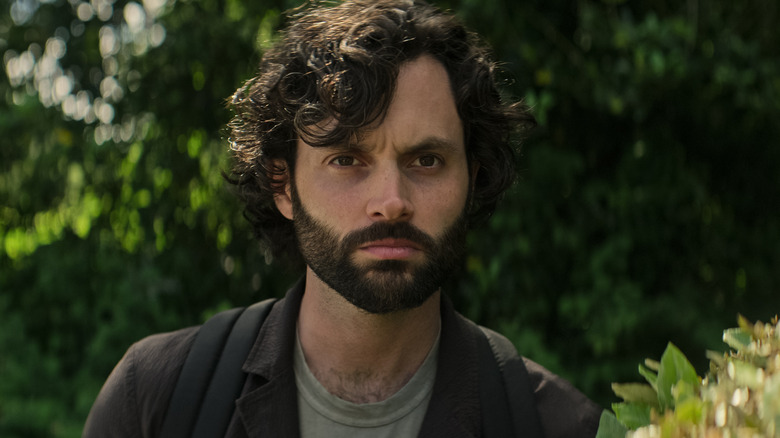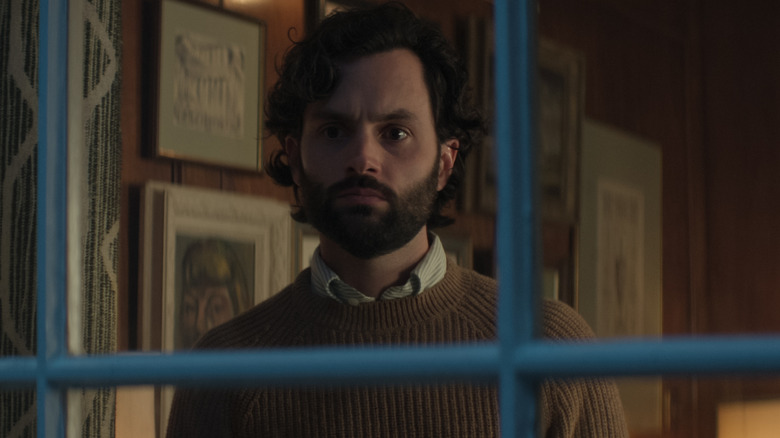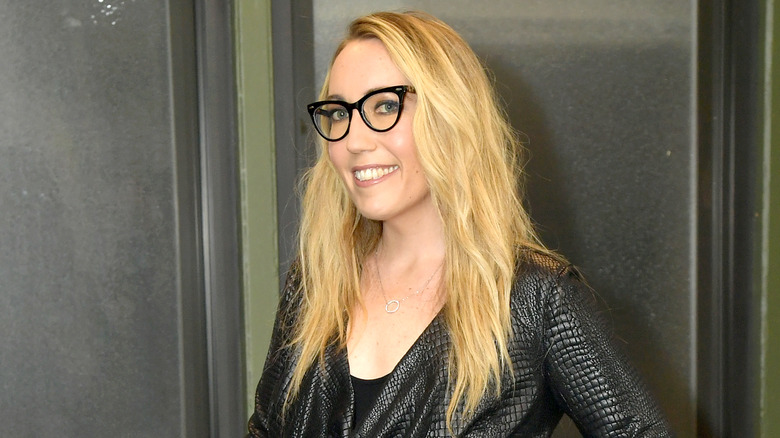Caroline Kepnes On Her Latest Joe Goldberg Novel, For You And Only You - Exclusive Interview
TV thriller "You" quickly found an audience on Netflix, making serial killer and eternal sad boy Joe Goldberg a household name in the process. With "Gossip Girl" icon Penn Badgley in the lead role, "You" found the sort of success that feels rare in the streaming age, inspiring a zillion memes and thirst tweets. But before "You" hit our screens, author Caroline Kepnes was deftly crafting the twisted character we've all come to love and hate.
With a background as a TV writer and entertainment journalist, Kepnes' talents were perfectly suited to novel writing. Every "You" novel is flawlessly infused with biting pop culture references and underpinned with a soul-crushing grief that makes protagonist Joe Goldberg impossible to forget. Now, Kepnes is back with the fourth book in the series, "For You and Only You," which follows Joe Goldberg's journey to becoming a respected novelist in his own right.
In an exclusive interview with The List, Caroline Kepnes revealed how she created Joe Goldberg, what it's like writing about murder for a living, and how she feels about Netflix hit "You" ending after five seasons.
Joe Goldberg came from a place of grief
Joe Goldberg is a cultural phenomenon. What inspired you to start writing about him, and where did he come from?
It's always the strangest thing because the short answer is: My dad died. He had this sick, dark sense of humor, was very loving, was very good to a lot of people, and also hated social media. He's sitting there dying and is like, "Don't put me on Facebook." That combination of things and then going through that loss at any time in anyone's life is a lot.
But it was 2013 when it was all [happening], and I remember learning what Instagram was. It violates everything that I learned in childhood, like, "Don't talk to strangers, don't tell people where you are." It was a combination of things, but above all, it was experiencing that level of loneliness. Whether or not someone dies suddenly, or in my dad's case, there's an illness and it's long, there's nothing like those months after when you realize they're never calling again.
That loneliness is in Joe and was part of the tragedy for him. That's home to him, so that's what he's always going to go back to. Then, on the other side of it, [it's] wanting to have a laugh. My mom and my aunts were reading it. Joe made me laugh. It was fun. It was like, "This is a safe, good place to just imagine." The entertaining part of it was the main thing. It was my own little therapy project. What a miracle it is to have the books [take off] and to have this [Netflix] show come about and people getting obsessed with this character. That's when I get tongue-tied because I'm still like, "Oh my God."
To come out of a place of loss like that, I'm so sorry for that. I lost my mom a few years ago, so I understand the feelings you're describing. To put your grief into a book — that's incredible.
Initially, I did write a very first-person account about caregiving and cancer, and it was like, "I'm not ready for that yet." I want to go to a sick, funny, out-there, totally different place, but a place I will never go to except in a book.
Joe Goldberg's journey to becoming an author
In "For You and Only You," Joe is pursuing his own writing career, and he finds a new romance. What do readers need to know about the next chapter of his journey?
It's a little "be careful what you wish for" because we've been with him a long time, and we know he has issues with the elites. Also, for him, falling in love means falling into a kind of hatred of the love interest's friends and her people and the people around her. I loved putting Joe in the belly of the beast. It's wonderful to take away his right to be an outsider, and he immediately is right back where he started. He will find a way to take issue with everyone around him — nobody's perfect except Joe.
It's a new Joe in this book. He went through the pandemic like we all did. It was really hard and fun to think about him going through that experience and him writing a book and how that experience would change him a little bit and would give him a new confidence, a self-awareness, but he is still rationalizing everything. I liked realizing that he spent a lot of time alone. He did kidnap someone during the pandemic, because he's Joe. But I liked him going into this book, having done all of this reflection and done all of that work of putting it all through the filter, and coming out thinking he has empathy for everyone — but of course, it's empathy for himself.
Now he's a writer. That's even scarier.
I also loved that conflict because he's so all-or-nothing. There's a part in the book where he is like, "Sometimes it's terrible when a reader becomes a writer." It was great to let him think of it that way, the way someone can do one or the other. He's got this issue now. He wants to be this lofty author, and he thinks now he's the genius and too good for everything. [But it's] realizing that people love a lot of different things, and he's the ego-centric wounded soul who hears someone say that they love someone else's book and is like, "What about me?" I liked that combination of him having to be extra hard on people because he is a little smarter now — the way that reading a book, you see things about yourself you don't necessarily want to see.
Embracing Joe Goldberg's penchant for murder
You have to live with Joe Goldberg every day. Do you ever wish you could get rid of him?
It's why we have these pillows. [holds up a pillow featuring Nicolas Cage's face] I feel like I have soft, funny things everywhere. I have a lot of "Waiting for Guffman" stuff. I have "Veep" things that I bought when they were selling them at an auction. I love having Joe and I love having him in the back of my head, walking through the motions with me. Every book I read, [I'm] imagining him reading it. There's a book that's coming out by Alice Slater, "Death of a Bookseller," and it was so fun to imagine Joe reading it.
Other times, when I'm about to write, I get very grumpy and very mean. It's almost like PMS, and I'm like, "Okay, here it comes." I think I'm in a bad mood — "What is this mood?" — and then it's like, "Oh, I just need to do some Joe." It's weird for 10 years to develop [this character]. I hope that for readers and people who love the show, there's an element of that there too. We see all the memes of, "Put yourself first, you're good enough, you're worth it." If there's one thing you can say about Joe, he does believe in himself.
You write a character who murders a lot of people. What's it like writing about murder and coming up with all of the terrible things that he does?
I've always loved reading stories with murder in them. It was exciting in ["For You and Only You"] because he meets a woman who writes thrillers and is a professional at the art of murder but has never done it in real life. Without giving things away, I love the conflict that he's so good at [murder]. It's fiction, so he's gotten away with a lot. I love his outrage at other people writing about things that he's actually done. The one thing in this world he can't brag about is being able to kill people and coming up with very creative ways of doing it.
In this book, you see his past. It's always there in every book. His past is catching up with him a little bit. But this time around we've got a podcast, and there's so many good books about podcasts, and it's in the air in the way it's something that happens in real-time. To think of that person out there knowing that someone is trying to figure out what they did — I liked that energy, playing with that.
Flipping the romantic comedy genre in You
Your books skewer the romantic comedy genre. What inspired you to take that genre and turn it on its head?
I love romantic comedies so much. Right before I wrote this book, I watched "Pitch Perfect" maybe a thousand times. Because of everything going on with my dad and my life, I've been out of it. I thought a lot of the songs in [the film] were new. I couldn't believe — it was like, "Oh, that's a cover. What?"
I love [the romantic comedy] beats of that story. It's that "what if" thing that writers do of, "What if in 'Say Anything,' she didn't like him? What if the guy doesn't take no for an answer ...?" We are always taught with all those movies that the man has to not take no for an answer, and that's what makes it a love story — that the woman pushes him away and he chases after her. But it's insulting to everyone all around, because it's this thinking that the woman really needs someone to control her into a relationship to show that they're not giving up. The man has to hear the word "no" and refuse to accept it. It's like, "And you wonder why everyone's f***ed up?" I'm inverting those stories. I do that naturally in my head. When I was writing the first [book, "You"], it was like, "I know what I'm doing here."
"You've Got Mail" is one of my favorite all-time movies. [Tom Hanks' character] has the one-up on [Meg Ryan] the whole time when they're talking, and he knows but she doesn't know. She's like, "I wanted it to be you." Well, what if she didn't?
That's why I love your stories. You pick things out that we accept as normal that are actually quite creepy.
Love is a convenient fantasy in storytelling. We love when people fall in love, and that's what it turns out to be. But what if it's not a two-way street?
Watching Penn Badgley become Joe Goldberg
The Netflix show has been a huge hit all around the world. How did it feel to see Penn Badgley take over your character?
Oh my God, wonderful. I remember early on watching him on a little tape they sent and getting chills. Everything from his tone of voice, the way he holds a book — it was like he's embodying this character. In that kind of a role where there's so much voiceover, I remember being on set and watching him do those scenes for the voiceover where he's going through it all a couple of times because he is standing in front of the building thinking things. I was so impressed.
In that way, it was a thrill because it's a hard thing to pull off. It's one thing when you're reading a book; they're such different experiences. You're in someone's head; you're in Joe's head. I didn't picture him a lot — it was more like I'd go in the world [or see an old movie] and be like, "That's Joe. That could be him." To see Penn allow to have the story work this way, where you're actually watching Joe ... He nails it over and over. It's clear that everyone else thinks so too.
He's got that dangerous quality where he's lovable but also bad.
It's that Maya Angelou quote that's one of my favorites about how people don't remember what you say or what you did, but how you made them feel. In that way, he's got that way about him, where when you're watching him, he can do things and you do feel for him. That's the scary key.
Preparing for the end of You
The TV show's gone in a different direction now from your books. What's it been like watching the story take on this whole other life?
I live in Hollywood, and some days I'm here writing my book and it hits me that literally a couple miles away, there's a bunch of writers sitting around doing their Joe story. That thrills me because that's what started me as a storyteller, seeing things and wanting to make my own version of that. It's so exciting to see people play with a toy and have their own world. Who doesn't like a multiverse? It's also a great feeling [having created] this character who is that fun to play with. It's fantastic.
Are you excited to see how the show ends, or are you nervous?
It's taking me back to the first season when they started doing all the casting. I'm looking at Elizabeth Lail and Shay Mitchell. They're all "out of control" good. It's one thing when you write a novel and kill a character — it's heartbreaking, but it's private. You can still talk about it; you can bring them back to life. But in the show, I remember saying, "Guys, does he have to kill everyone? Look at this cast." They're like, "It's your f***ing book. This is what he does."
It's that feeling where I feel spoiled. In this day and age, to get five seasons, I'm completely grateful. On the one hand, I know that's amazing and great. But I'm like, "It's really going to end," because it's become this holiday over the years of the buildup, every step of it, the casting, seeing people get excited for it. It's that thing when you see people so excited for something.
On becoming a novelist
You worked in television before you became a novelist and you also worked as an entertainment journalist. How did those experiences play into you writing "You"?
Oh God, so much. With journalism to start, I loved being edited. I loved deadlines. I remember going to Entertainment Weekly from Tiger Beat, which was my first big journalism job, and they had fact-checkers and editors. They were like, "You're going to write this 300-word review of the show." I'm like, "300 words?" To see it go through round after round [of edits] and to learn firsthand, under that deadline ... I like journalism, especially back then. It was weekly and it felt intense. To write it, to get to immediately apply what you just learned to something else — that was the energy that I loved. To this day, I do that with my writing.
I love television and I love the entertainment, the way the story moves and moves. That experience was great too — getting to see how things play out in the simplest way of the difference between what's in the script [and] what an actor does with it when they read a line. With the audiobook, with the first book ["You"], when I heard Santino [Fontana], I'm like, "Oh my God, he's a genius." I love what he's doing with the words. When someone is that focused, they do bring a humanity, their own take on it. It felt natural for me with Joe that, because I have watched so much TV too, I'm like, "I want this to be as fun as watching TV."
My very first creative job was at Conan O'Brien, where I was a script intern. That was every day, and I did not last long because that gave me a nervous breakdown. I always wanted to write books because I like how long you have to rewrite everything. It's why I'm very bad at Twitter. I like to rewrite. I like to walk away from it, go look back. Books feel good.
What do you hope fans will take away from your new book?
I hope that if they're reading and writing, they'll read and write more. With this book in particular, I hope they'll know that with bad things that happen to you, there is a way to make them good and let them reshape ... [and] make you come out better than before. It's a lesson of so many books. So many books with that theme have inspired me, and this is my dark, sick version of — without spoiling things — seeing Joe go into the dark and reemerge a little better.
"For You and Only You: A Joe Goldberg Novel" is out now from Random House.
This interview has been edited for clarity.
